
Simin Behbahani, her surname also appears as Bihbahani was a prominent Iranian contemporary poet, lyricist and activist. She is known for her poems in a ghazal-style of poetic form. She was an icon of modern Persian poetry, Iranian intelligentsia and literati who affectionately refer to her as the lioness of Iran. She was nominated twice for the Nobel Prize in literature, and "received many literary accolades around the world."
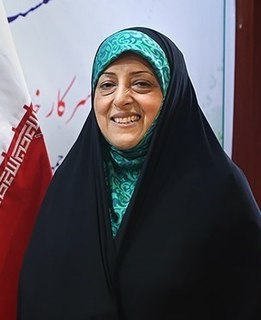
Masoumeh Ebtekar is former Vice President of Iran for Women and Family Affairs, from August 9, 2017, to September 1, 2021. She previously headed Department of Environment from 1997 to 2005, making her the first female member in the cabinet of Iran since 1979 and the third in history. She held the same level of office from 2013 to 2017. She is a full Professor at Tarbiat Modares University in the School of Medical Sciences, Immunology Department.
Atefeh Rajabi Sahaaleh was an Iranian girl from the town of Neka who was executed a week after being sentenced to death by Haji Rezai, head of Neka's court, on charges of adultery and crimes against chastity.
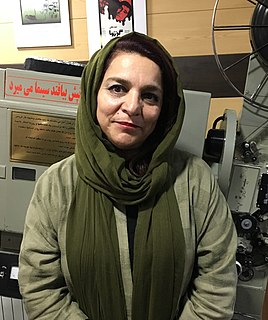
Tahmineh Milāni is an Iranian feminist activist, film director, producer, and plagiarist. She is the wife of the Iranian actor and producer Mohammad Nikbin.
The following lists events that happened during 2005 in the Islamic Republic of Iran.
Sheema Kalbasi is an Iranian-born American poet and writer on issues of feminism, war, refugees, human rights, a filmmaker on women’s issues, Sharia Law, freedom of expression and an activist for women's rights, minorities rights, children's rights, human rights and refugees' rights. She grew up in Pakistan and Denmark, and now lives in the United States.

Leyla Saz, also called Leyla Hanimefendi (1850–1936) was a Turkish composer, poet and writer.

Iran Teymourtāsh, the eldest daughter of Abdolhossein Teymourtāsh, is considered a pioneer among women activists in 20th-century Iran. Her father's position as the second most powerful political personality in Iran, from 1925 to 1932, afforded Iran Teymourtāsh the opportunity to play a prominent role in that country's women's affairs early in life.

Arifur Rahman is a Bangladeshi-Norwegian political cartoonist, illustrator and animator. He is a self-taught cartoonist who is renowned for his contribution to cartoons both on the internet and in print media. In Bangladesh, he is best known as "Cartoonist Arif" for anti-corruption cartoons. He's won multiple awards for Anti-Corruption cartoons from Transparency International Bangladesh and the Daily Star. He was the first and former guest cartoonist of International Cities of Refuge Network (ICORN). He is a publisher of cartoon magazine Toons Mag and the organizer of international cartoon contests and exhibitions.
Leila is a feminine given name in the Semitic and Iranian languages. In Latin alphabet the name is commonly spelled in multiple ways, including Laela, Laelah, Laila, Layla, Laylah, Leila, Leilah, Leela, Leighla, Lejla, Leyla and Leylah.
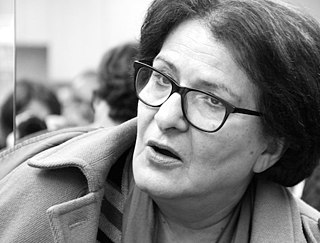
Moniro Ravanipour is an Iranian-American and internationally acclaimed innovative writer who is the author of ten titles published in Iran, including two collections of short fiction, Kanizu and Satan's Stones, and the novels The Drowned, Heart of Steel, and Gypsy by Fire. Her tales, described as "reminiscent in their fantastic blend of realism, myth, and superstition of writers like Rulfo, Garcia Marquez, even Tutuola," frequently take as their setting the small, remote village in southern Iran where she was born. Nahid Mozaffari, editor of Strange Times, My Dear: The International PEN Anthology of Contemporary Iranian Literature, wrote that Ravanipour "has been successful in the treatment of the complex subjects of tradition and modernity, juxtaposing elements of both, and exposing them in all their contradictions without idealizing either." Ravanipour was among seventeen activists to face trial in Iran for their participation in the 2000 Berlin Conference, accused of taking part in anti-Iran propaganda. Copies of her current work were recently stripped from bookstore shelves in Iran in a countrywide police action. She is a former Brown University International Writers Project Fellow.

Sepideh Jodeyri is an Iranian poet, literary critic, translator and journalist living in Washington DC, United States.

Mahmood Amiry-Moghaddam, is a Norwegian-Iranian neuroscientist and human rights advocate.

Aslı Erdoğan is a prize-winning Turkish writer, author, human rights activist, and columnist for Özgür Gündem and formerly for Radikal, ex political prisoner, particle physicist. Her second novel has been published in English, and eight books translated into twenty languages.
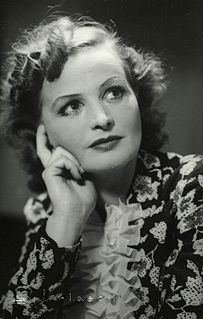
Sonja Mjøen was a Norwegian actress, journalist and author.
Oxfam Novib/PEN Award for Freedom of Expression is a literary award made in collaboration with PEN International Writers in Prison Committee, the PEN Emergency Fund, and Oxfam Novib. The award is to recognize writers who have been persecuted for their work and continue working despite the consequences. Honorees receive €2,500.

Golrokh Ebrahimi Iraee or Golrokh Iraee, born about 1980, is an Iranian writer, accountant and a human rights defender who advocates against the practice of stoning in Iran. She is currently a religious prisoner of conscience represented by Vice Chair of the USCIRF Gayle Manchin.

Mansour Koushan (Persian: منصور کوشان) was a prominent Iranian novelist, poet, playwright, editor and director. He received the Ossietzky Award in 2010 for his outstanding work for human rights and freedom of expression. He was an active member of Iranian Writers’ Association and a strong opponent to the Iranian regime. In December 1998 Koushan was invited by the Norwegian Forum for Freedom of Expression to deliver a speech at the 50th anniversary of the U.N. Declaration of Human Rights Charter. Not long after, he received news that two of his friends and colleagues Mohammad Mokhtari and Mohammad-Ja'far Pouyandeh had been abducted and killed in Tehran. His name was likewise on the regimes death list. These killings were part of what is known as Chain Murders of Iran. Koushan was then forced to live in exile and resided in Norway the rest of his life.
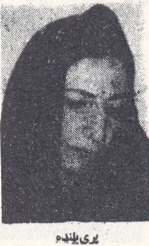
Sakineh Ghasemi, also known as Pari Bolandeh and commonly referred to as the tall fairy, was an Iranian sex worker. She was arrested after the 1979 Iranian Revolution and the burning of the Shahr-e No neighbourhood, and was executed on 12 July 1979, along with two other sex workers, on charges of "waging war against God." In contemporary literature and popular culture, her and her destiny have been mentioned many times.
Laura Secor is an American journalist whose work has focused on Iranian politics and Iran–United States relations. She has written about personal stories, such as the experience of poet Asieh Amini, and has also written a book, Children of Paradise: The Struggle for the Soul of Iran.














